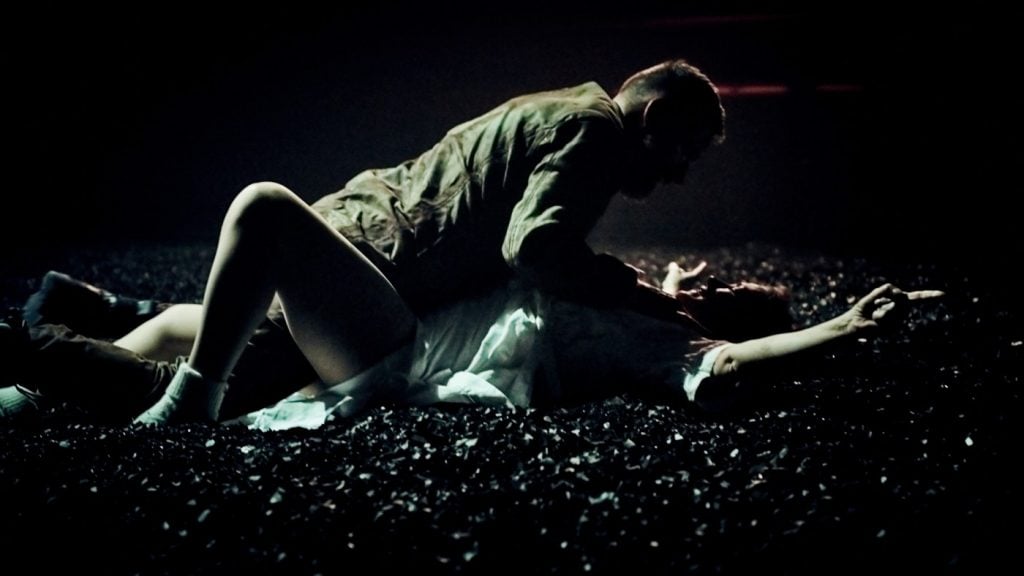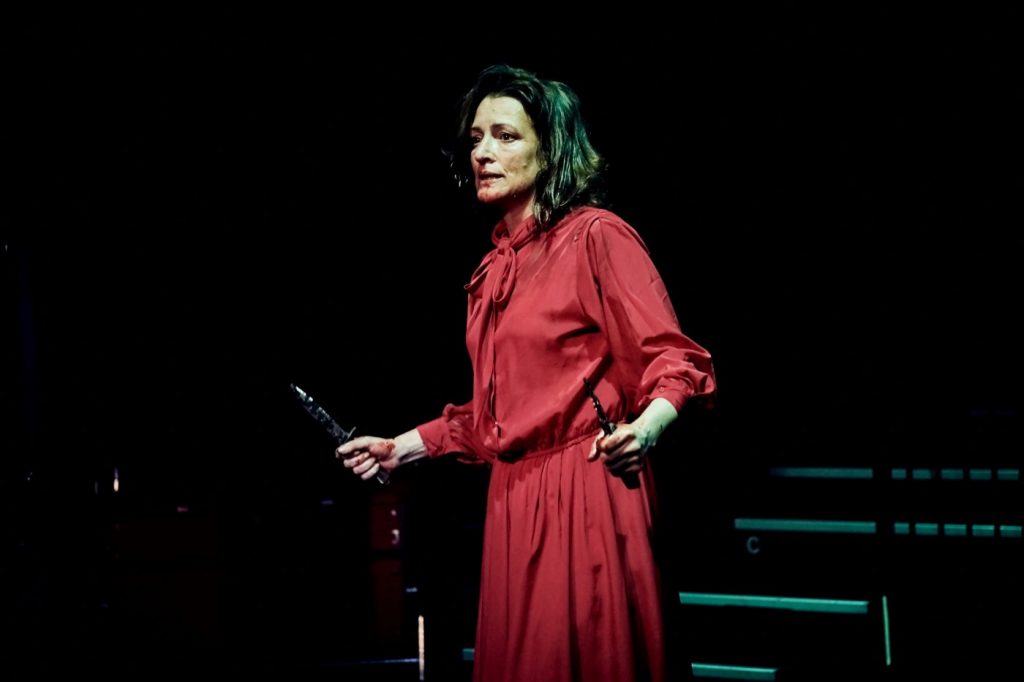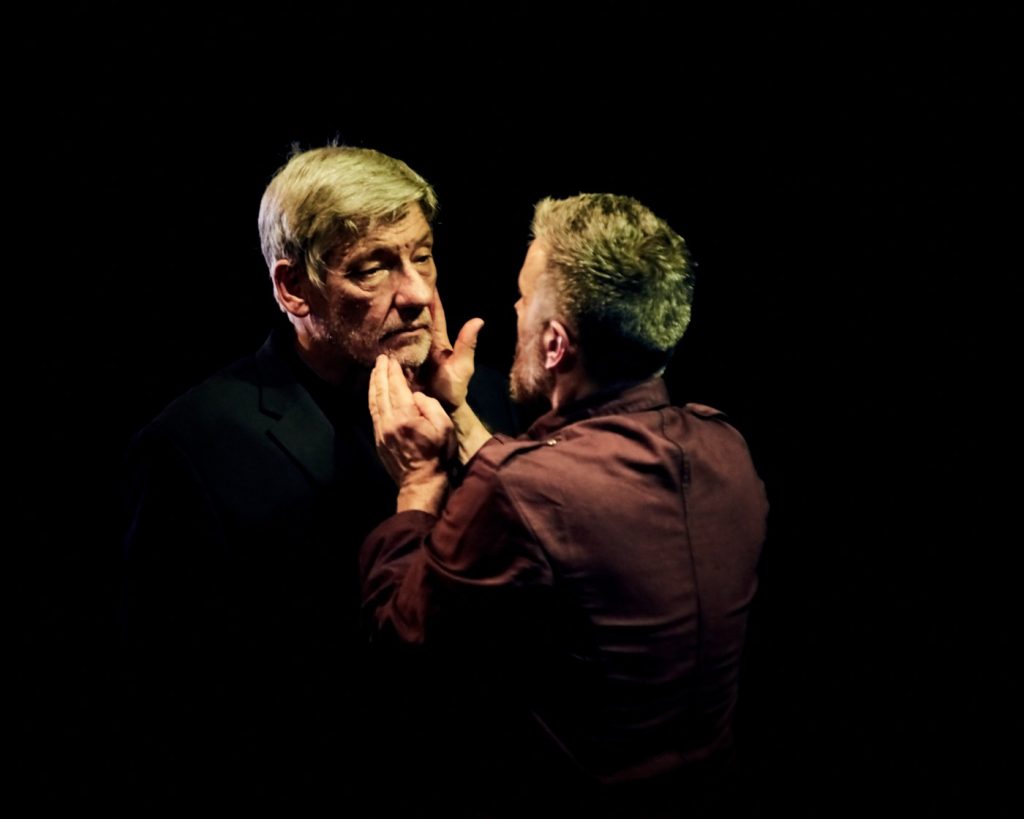Justin Kurzel’s magnificent film is a hard act to follow for any director looking to say something new about Macbeth for a modern-day audience, yet Adele Thomas manages, in places.
Thomas’s production of Macbeth launches the inaugural season for the new resident professional company at the Tobacco Factory Theatres and contains some notable touches of originality. The stage floor is covered in chopped rubber tyres causing the actors to stumble at times, reflecting the precarious and shifting world of the play.
Particularly subtle is Lady Macbeth’s fondness for Fleance, with Macbeth’s attempt to kill him perhaps the breaking point in their relationship.

Jonathan McGuinness and Katy Stephens. Photo Credit: Mark Dawson Photography
Despite the close attention to detail in this production, certain discrepancies suggest a less focused approach to the language of the text. It is difficult for the staging not to jar with the script, describing the witches as “black and midnight hags”, when in fact they appear dressed entirely in white outfits. The reference to the witches’ beards in Act I Scene III, when there is obviously no facial hair in evidence, could easily have been cut. Later in the play, the daggers used in fighting sequences somehow also exist as “swords”, but curiously only in the minds of the characters fighting. Is this really all part of the uncanny world of 11th century Scotland being created for us? Whilst Macbeth is partially about the slipperiness of the senses and indeed language itself, there is a risk that the audience might feel the script has just been overlooked in places.
Equally disruptive is the persistent use of blackouts accompanied by strobe lighting and drone-like music between each scene. While the aim is probably to heighten the dramatic tension, given the latent menace within the text, the effect is often overdone, disruptive, and bordering on the ridiculous.

Katy Stephens. Photo Credit: Mark Dawson Photography
In trying to position Macbeth as some kind of horror film, all elements of the play have to be raised to the same level, meaning there is nowhere further for the actors to go at moments of crisis. Act III Scene IV sees Macbeth holding a feast following his coronation and it is at this moment, when the Macbeths have to play out their deception most skillfully, that Banquo’s ghost arrives and ruins it all. Yet this moment becomes so thoroughly over-hyped as to draw giggles from the audience. In contrast, other parts of the performance fell rather flat. Most notably the porter scene which, devoid of melodrama, seemed inconsistent with the rest of play.
What really does stand out, however, is the quality of the acting. As Macbeth, Jonathan McGuinness manages to capture vulnerability and innocence, often staring in a bewildered manner around the stage akin to a child’s incomprehension at the complicated nature of the world.

Simon Armstrong and Jonathan McGuinness. Photo Credit: Mark Dawson Photography
Katy Stephens’ portrayal of Lady Macbeth at times slips into the nagging wife instead of manipulating seductress. However, the seminal madness scene is one of the true highlights of the play – delivered with a freshness and vigour preventing the language from slipping into cliché despite how well known this scene is.
But the best performance is given by Jack Riddiford. His natural delivery of Shakespeare’s language is wonderful to listen to, and the portrayal of Malcolm as a sort of tortured modern-day hipster brings a breath of fresh air into the drama. Malcolm’s recognition of the dangers inherent in his position as heir to the throne provides a stark contrast to the other characters’ lack of understanding. In Malcolm there seems to be a hero strong enough to overcome the menace of the play.
Macbeth runs at the Tobacco Factory Theatres until Saturday 7th April 2018.
Filed under: Theatre & Dance
Tagged with: Macbeth, performance, play, Shakespeare, The Tobacco Factory Theatres, theatre, William Shakespeare


Comments